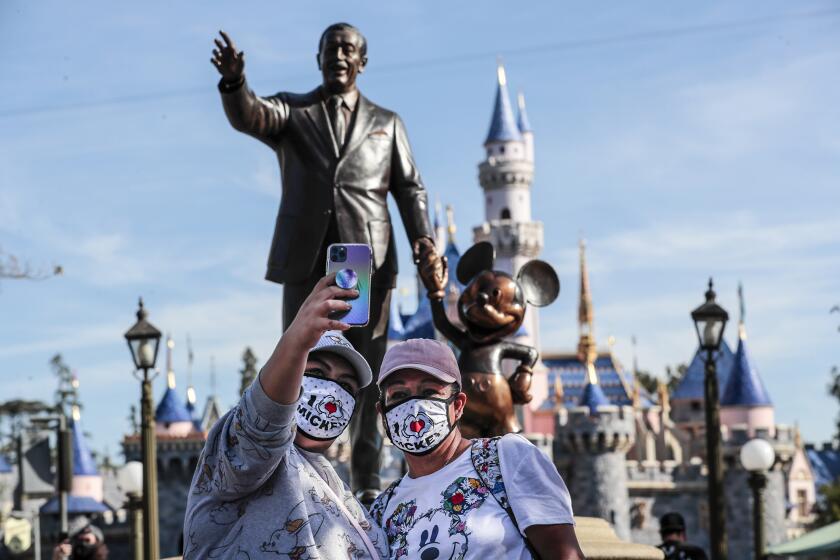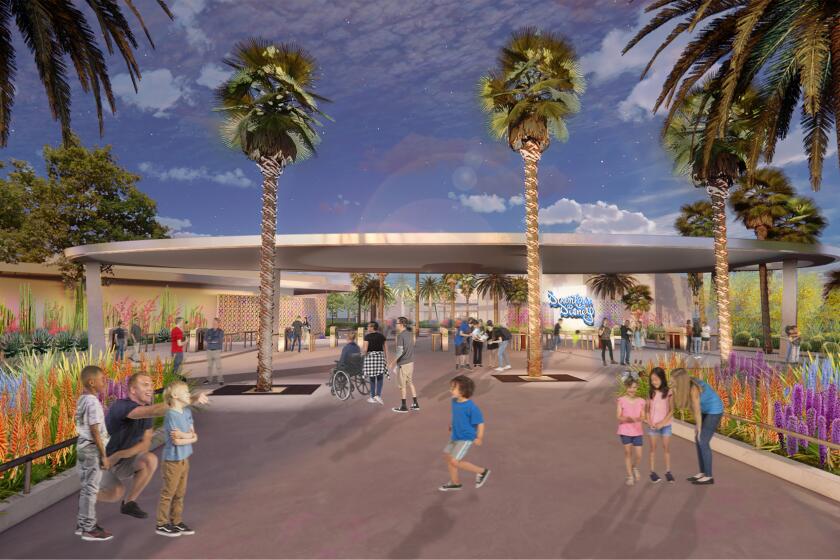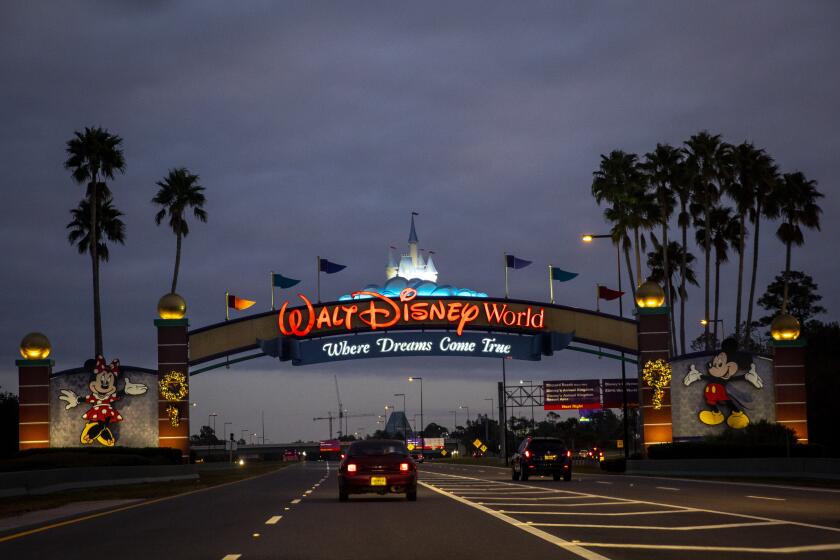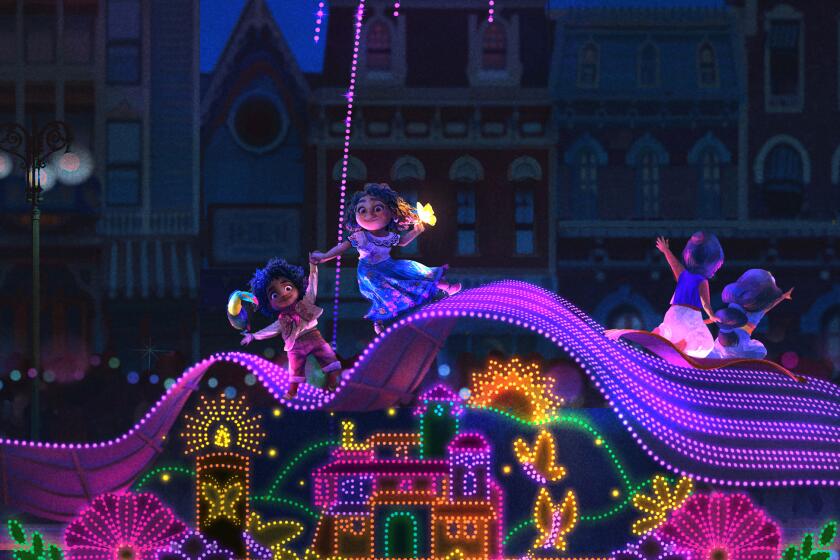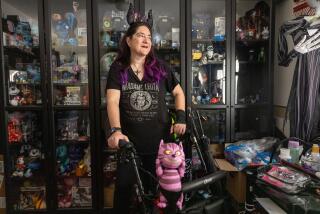Disney parks boss on diversity, preventing division and Disneyland’s Electrical Parade return
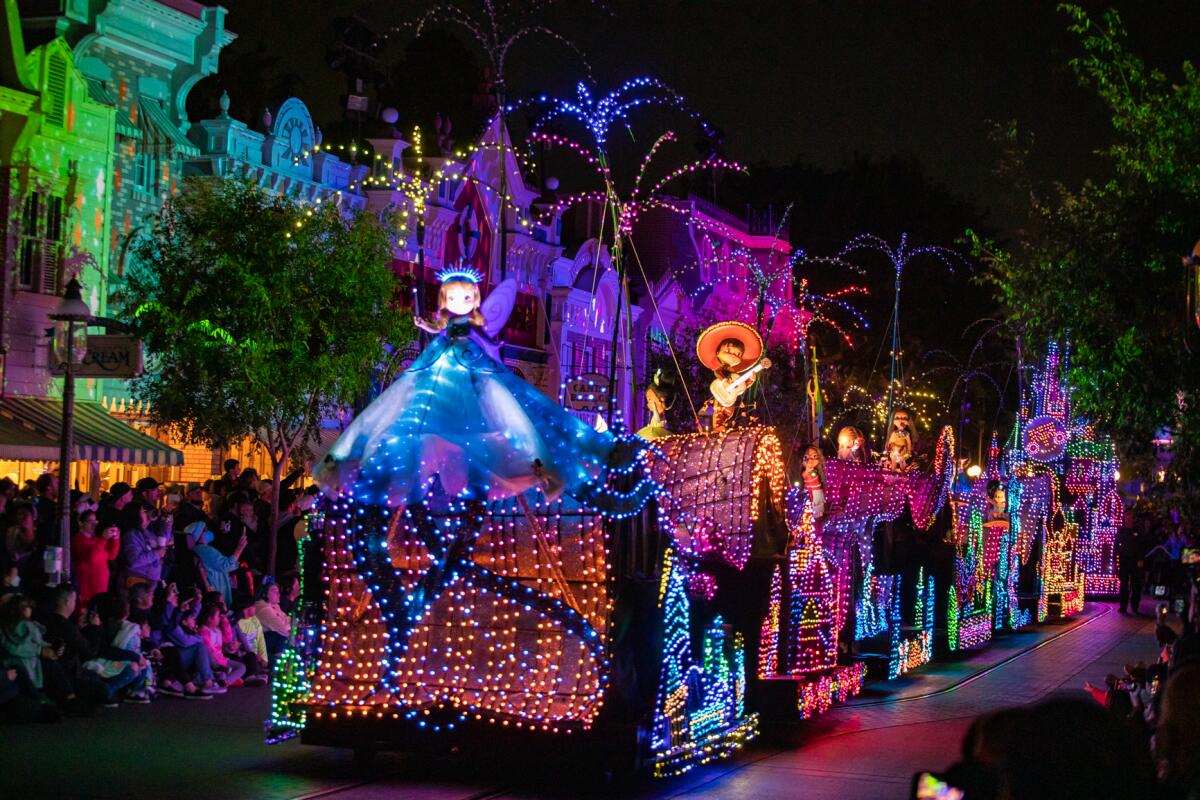
- Share via
Disneyland, a rite of passage for many Southern Californians, celebrated its second proper grand opening a year ago this week on April 30. After a pandemic-induced closure of just over 13 months, a park that since 1955 has put forth the argument that there is a better, more triumphant version of reality unlocked its turnstiles to teary-eyed, COVID-weary fans.
For Disneyland, what followed the reopening in a time of global uncertainty was great change inside and outside the parks.
Just last week, as Disneyland brought back a number of evening shows — including the charming Main Street Electrical Parade, reimagined with a new finale that champions the we’re-all-in-this-together mantra of “It’s a Small World” — the company found itself thrown into the center of our country’s cultural wars.
Disney’s public response — and its initial lack of one — to anti-LGBTQ legislation in Florida led to debates within and without the company and now has blown up with Florida’s Republican leadership taking retaliatory moves to dismantle long-held operational privileges given to Walt Disney World.
With COVID-19 abating in California, Disneyland reopened on April 30. After 13 months away, how did it feel?
Inside the original Anaheim park, the reemergence of the Electrical Parade, World of Color and an evening fireworks show — plus this week’s news that the park is dropping one of its last mask requirements (on shuttle buses) and plans new hotel and restaurant investments — demonstrate that the Disneyland Resort is inching closer to operating at prepandemic levels, estimated to be approximately 19 million guests on a yearly basis. To those faithful, tweaks to line-shortening programs, such as the evolution of the free Fastpass system and the paid Genie+ initiatives, are matters of great debate, as Disneyland remains a memory-shaping experience as paramount to California culture as Dodger Stadium or Griffith Park. Any change is subject to grand discussions on social media and theme-park-focused news sites.
Disneyland’s special appeal can sometimes be “hard to explain,” especially to those who look at the company’s fairy tales and don’t see metaphors for our own moralities, fears and hopes, said Josh D’Amaro, chairman of Disney Parks Experiences and Products, the division responsible for Disney’s global theme park portfolio. D’Amaro was speaking earlier this month, hours before the refreshed Main Street Electrical Parade would debut to guests, chatting on a stroll from Main Street, U.S.A., through Fantasyland and Galaxy’s Edge.
New restaurants, one throwback and other changes are coming to Downtown Disney, part of tens of millions of dollars in investment, the company said.
D’Amaro was stopped repeatedly by guests on the walk, with attendees either thanking him for maintaining the park or asking for a selfie. When trying to define Disneyland’s appeal, D’Amaro spoke of the company’s original attractions, contributions to American Pop Art such as Space Mountain, a ride he described as one of his favorites. But he also zeroed in on the way the park can make each individual guest feel seen, whether by interactions with Disney’s staff — cast members, in park parlance — or the return last week of one-on-one character interactions and hugs after the pandemic required such moments to be socially distanced.
Disneyland walks a uniquely American line, one that represents capitalistic interests and artistic pursuits while striving to feel uniquely personal to each guest.
“There’s nothing here that doesn’t have a story attached to it, whether it’s the tree that was there when Walt [Disney] built this theme park that we try to preserve, to the castle and its color, all the way from top to bottom,” said D’Amaro. “Every single piece has a story associated with it.”
And in 2022, any of those pieces can suddenly erupt into a cultural lightning rod.
Florida’s Senate on Wednesday voted to dissolve the Reedy Creek Improvement District, which allows Disney to function as its own government.
D’Amaro wasn’t willing to comment on the political battles happening outside of Disneyland’s walls — the berm, as it’s known — but he acknowledged the delicate line the company has to walk as it balances nostalgia with the future.
The newly revived Electrical Parade, for instance, once ended with a float that celebrated outmoded ideas of American exceptionalism; now there is a grand finale that reflects historic Disneyland designs while championing modern tales such as “Encanto,” “Frozen,” “Raya and the Last Dragon” and “Moana,” among other inclusive stories that better reflect the park’s fan base. And last summer, problematic caricatures were removed from the Jungle Cruise. (A reimagining of Splash Mountain, a ride inspired by the racist film “Song of the South,” remains in the works.) But any alteration to the park’s history comes with the danger that it might alienate some or, worse, allow misguided accusations that the company is giving in to leftist ideals rather than simply awakening to its cultural reach.
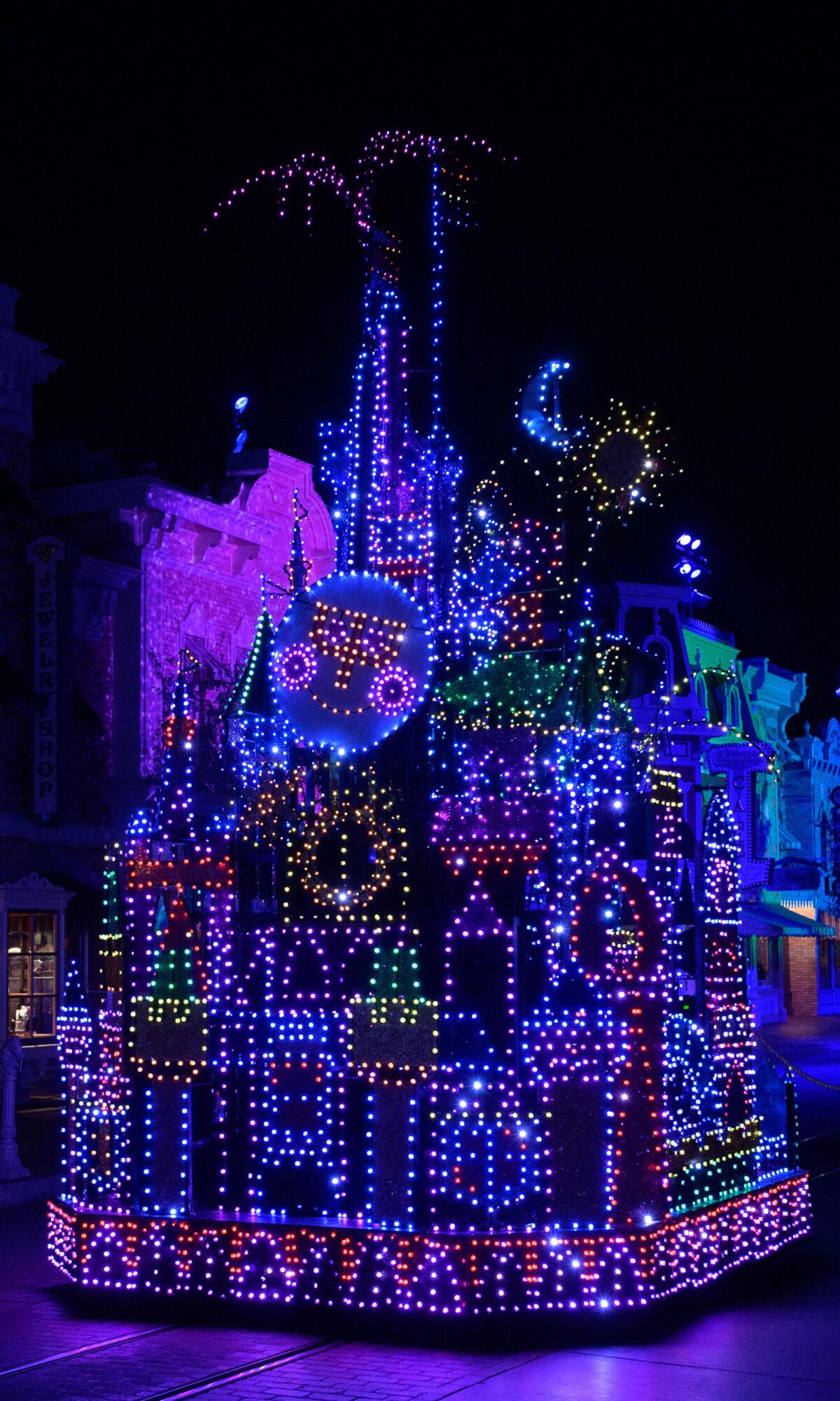
“How do you think about what our guests love so much versus the fact that you want to invite new guests in and move to new frontiers?” D’Amaro said. “It’s a great balance and it can be difficult. You have the traditionalists and the ones who maybe want to be a little more proactive in their thinking. I would rather be in a position where guests are more interested than they are not.”
D’Amaro brought up the time a couple years back when he was stopped by park regulars on Main Street who took issue with recent updates.
“They took exception to some changes we had made, so I walked over to them,” he said. “I think they thought I was going to run away. I said, ‘Let’s talk about this. Let me introduce myself. My name is Josh D’Amaro. I’ve been here 25 years. I started in an entry-level position in this park. I love this park. I love Walt Disney. I know the history. I know every square inch of this park. I’m trying to do my best to make sure we preserve everything that you love and that we invite more people in to preserve this for their grandchildren.’ They understood it.
“We will make some decisions that people may raise their eyebrows at,” D’Amaro continued. “They may say, ‘Well, that’s different and I’m not sure what to make of it.’ But in the end, our objectives are to keep this place vibrant, alive and still nostalgic, but ready for the future.”
Disneyland’s Main Street Electrical Parade returns in April minus its U.S. flag float and with new characters from “Encanto” and “Raya and the Last Dragon.”
Asked specifically about 2022’s contentious, social-media-driven climate, D’Amaro said, “That would mean that everything you say or do, you should be able to stand behind. You should feel good about it. You should be clear about your intentions.”
Operationally, mobile technology has become paramount in navigating the park. Disneyland has invested heavily in its app and has increasingly made it an integral part of a day there — an admission that even those seeking a respite from daily life are still heavily devoted to their personal devices.
A fan-loyalist annual passholder program was reimagined, and those who haven’t been to the park in years will find that a post-pandemic day at Disneyland requires more planning than one, say, five years ago. The park’s reservation system that now requires both day guests and Magic Key passholders to reserve a specific day with their ticket purchase is here to stay.
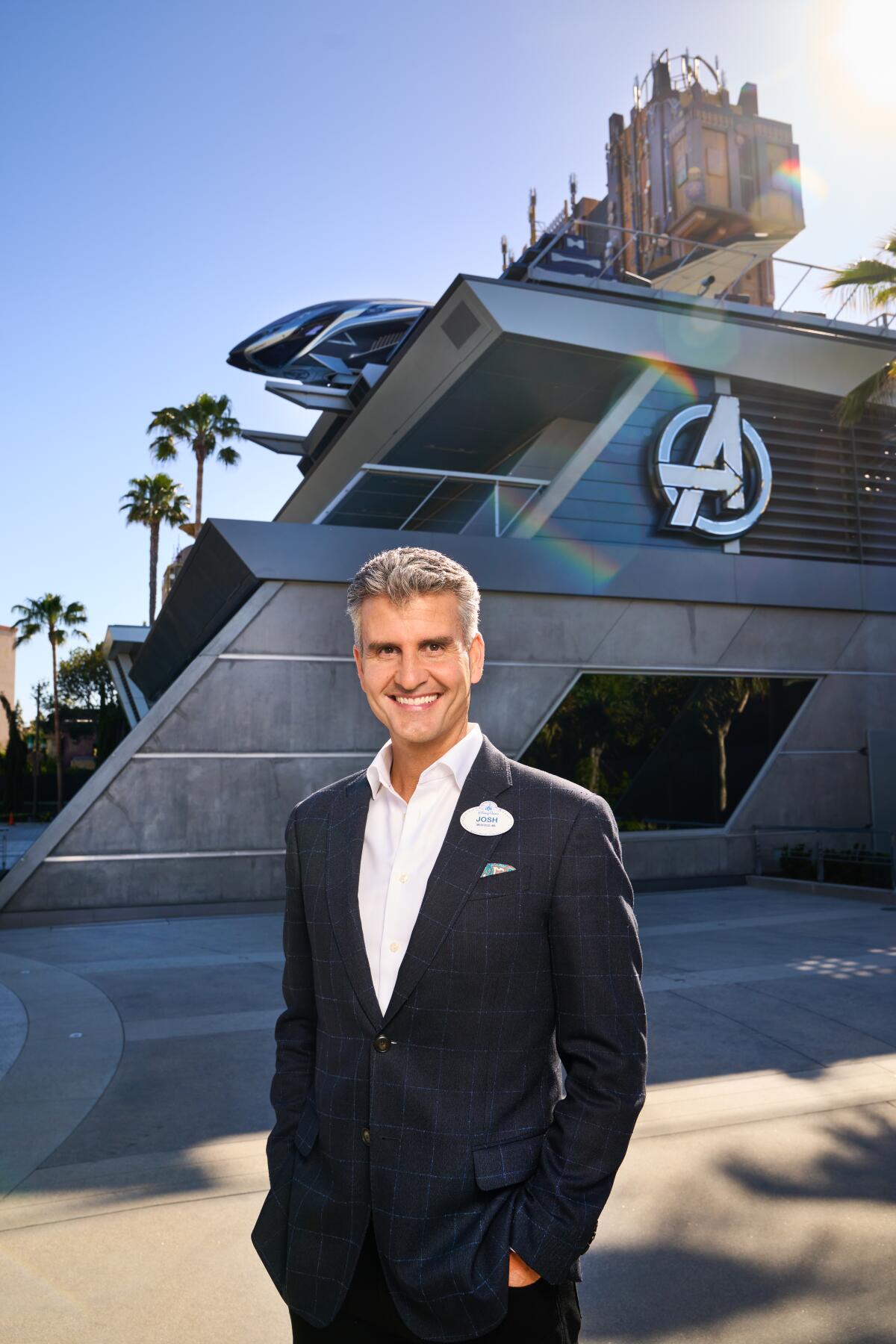
The park, D’Amaro said, will continue to lean into technology, integrating it sometime this year, according to the Anaheim park’s website, with MagicBand+, wearable tech that’s long been a staple of a Walt Disney World vacation. The wristbands allow for a range of activities, from unlocking hotel rooms to teased interactions throughout the park. While Disneyland’s integration of MagicBand+ has yet to be fully detailed, it’s mentioned by Disney as a method for giving visitors potential new interactions that allow for additional game-like experiences in, say, Star Wars: Galaxy’s Edge.
“Every piece, every corner, every tree, there’s a story behind it, and I think we’ve got endless opportunities to go deeper and deeper and richer and richer, to levels that, if you want to go incredibly deep, you can,” D’Amaro said. “If someone just wants to take it in at face value, they can, but this world where we can merge digital and physical, I don’t think there’s any company in the world that has the ability to do what we do. The opportunities are endless and you’ll see us lean very heavily into that space. ... And you’ll see them sooner rather than later.”
Already a few months old are the free Genie and paid Genie+ additions, which can offer recommendations to park guests or, for a $20-per-person fee, provide expedited entry to various attractions, so-called “Lightning Lane entrances” that are similar to the old MaxPass service. Some in-demand rides, such as Disneyland’s Star Wars: Rise of the Resistance or Disney California Adventure’s Web Slingers: A Spider-Man Adventure, both still relatively new, require an additional a la carte fee for line-skipping abilities.
The paid Genie+ service can be an especially valuable time-saving tool for those guests spending a full day at the park; it allows quick access to most, if not all, of the offered attractions. Return times for rides, however, can sometimes dwindle in late afternoons or early evenings, and an eternal fan debate is one that seeks to answer how such services affect the non-paid stand-by lines. D’Amaro said it’s early days still for the Genie/Genie+ services, and they will continue to be adjusted.
“The adoption has been far greater than we initially expected,” D’Amaro said. “That’s a good sign. People want the product. We’re able to see that guests who are purchasing Genie+ are getting on more of their preferred attractions. We know they’re moving around the parks in ways that are productive for them and, quite frankly, productive for the park. We can make sure that everybody is enjoying a great experience, and where there are pinch points we can redirect people. The early results are strong for us, but are we done? Not even close.”
D’Amaro said staffing is essentially at the level the park wants, although he acknowledged that updates and fine-tuning still have to occur. Dining reservations, as park regulars have noticed, are still hard to come by, and daytime parades such as Magic Happens, which launched just before the start of the pandemic, have yet to return.
“We’re not going to snap our fingers quickly and everything is going to be right back where it was. We’re staging this return, this comeback. So there are certain areas here and there that aren’t exactly where they were prepandemic,” D’Amaro said.
“We want to do this right,” he continued. “So if we’re restaging a firework show, or restaging a parade, we’re going to make sure we have the right cast, and our cast have been trained the right way. So basically what we’re doing is sequencing the return of these events, and to make sure every time you come back there’s something new and fresh.”
Another nighttime show, Fantasmic!, will launch on May 28. Also coming soon is a refresh of the walk-through attraction Tarzan’s Treehouse, although D’Amaro declined to discuss any specifics beyond saying, “It’s going to be cool.”
Not every change is as visible or as obvious as a new attraction. D’Amaro is proud, for instance, of cultural changes, such as those that relaxed rules around the look of staff and gave cast members more freedom in how they appear for work, including the ability to choose gender-inclusive costumes and hairstyles, as well as the ability to show off their tattoos. While there are still guidelines to follow, D’Amaro believes such changes create a more lively, animated environment for cast and guests.
“When a cast member is standing in front of a guest, they can tell their story. They can tell their story in the context of a Disney story. The power of Disney is in the cast. The more freedoms you can give while still putting on an amazing show, the more powerful this place becomes.
“The world can be a divisive place,” D’Amaro said, “but this is a place where I want people to come together and express themselves in ways that make this place come to life.”
More to Read
The biggest entertainment stories
Get our big stories about Hollywood, film, television, music, arts, culture and more right in your inbox as soon as they publish.
You may occasionally receive promotional content from the Los Angeles Times.
